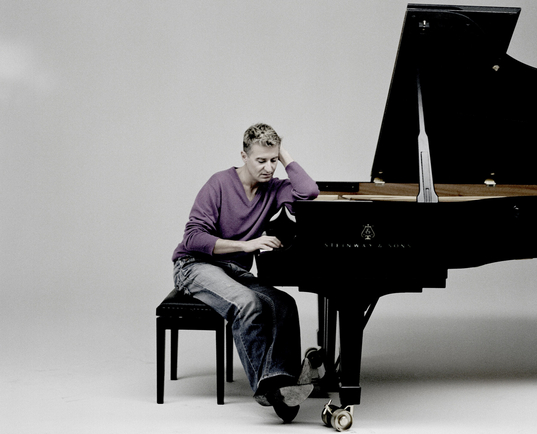Pianist Jean-Yves Thibaudet returning with Ravel and Brahms

Jean-Yves Thibaudet returns to Ann Arbor with a program of Ravel and Brahms at Hill Auditorium next Saturday.
Decca Kasskara
“People forget that I’m half German,” Thibaudet said by phone recently, reminding a caller that though he is French, with a French father, his mother hailed from Hamburg.
Still, France was home, and he is not merely a beneficiary of French musical education — he entered the Paris Conservatory at 12 — he is, through a key teacher, an heir to Ravel.
“I adore Ravel,” Thibaudet said in his very fluent, rapid English. “He is one of my favorite composers, and though there are a lot of others, he is the one I feel the closest to. I played him from the time I was very young. In fact, the (Ravel) G Major concerto was the first one I played, by choice, with an orchestra, when I was 11.”
The teacher responsible for Thibaudet’s strong connection to Ravel was Lucette Descaves, a friend and collaborator of the famed composer.
“Mme. Descaves played with him and for him and spent a lot of time with him,” Thibaudet said. “I feel I have that amazing connection, I feel like I met him, she told me so many things about him and so many things that are not in the score.”
Thibaudet recalls how she would go “into the cupboard next to the piano, which had her scores,” when a question about interpretation in Ravel arose. “She would pull out an old score, which was probably the original, and show it to me and say, ‘See, mon petit chou, everything in marked in blue is what Ravel said.’”
That experience was magical for Thibaudet, just as Ravel’s music continues to be for him.
“A lot of people think Ravel is cold,” he said, “but I don’t find that. To me it is magical and sensual. There is an emotion in the music that comes from simplicity — like in Mozart, almost — and that goes immediately to your soul.”
In the Ann Arbor concert, sponsored by the University Musical Society, Thibaudet plays Ravel’s “Miroirs,” a set of five pieces that, he notes, is not played very often, and Ravel’s “Pavane pour une infante defunte” (“Pavane for a dead princess”), a work that Ravel himself hated, Thibaudet noted, but which Thibaudet — and almost anyone who knows it — loves.
“It’s very simple,” he said, “but he made it so elegantly. And I like the piano version more than the orchestral version. It’s more touching, and the colors of the piano are so beautiful.”
The five pieces in “Miroirs” — “Noctuelles” (“Night Moths”); “Oiseaux tristes” (“Sad Birds”); “Une barque sur l’ocean” (“A Boat on the Ocean”); “Alborada del gracioso” (“Dawn Song of the Jester”); and “La vallée des cloches” (“Valley of the Bells”) — have only the connection of having been made as musical portraits. Ravel did not intend them as a cycle. That said, it’s a valid question in Thibaudet’s mind whether there is a dramatic arch to the group when all five pieces are played together.
"Miroirs: I. Noctuelles" - Jean-Yves Thibaudet“You do make some connection as a player,” he said. “I’ve done (the set) in different ways. When I was younger, I reversed the order of the last two, so instead of ending with with ‘La vallée des cloches,’ which ends so soft, I would end with ‘Alborada del gracioso’ to get the screaming at the end. Now I play them in the order as written. First of all, I’m not finishing the whole recital with ‘La vallée des cloches,’ which is magical — beyond magic, hypnotic, one of the most amazing pieces. And after that piece it’s a sacrilege to do ‘Alborada.’ In some ways ‘Alborada’ is the end of the set, and then ‘La vallée des cloches’ is an epilogue, like in Ravel’s ‘Valses nobles et sentimentales.’ The five pieces really work in the original order.”
Thibaudet’s love for Ravel doesn’t exclude composers like Brahms on his “German side” — “my other half and very importantly so,” he said. “I feel a very special connection to Brahms.”
And in the Brahms Sonata No. 3 in f minor, Op. 5, he hears a young Brahms “and a young Brahms in love, full of passion and the youthful fire you have when you are young.”
The sonata, a large, five-movement work, was something Thibaudet played a lot himself when he was younger.
“It was one of my big competition pieces,” he said. “Then I didn’t play it for almost 20 years, and then a few years ago, I decided to bring it back, and I’m so happy I did. It’s Brahms at his best.
“And it is terrific for the audience to see how the piano is used in Ravel and how it is used in Brahms, and to hear how different the sound one pianist makes can be. Ravel is crystalline, delicate, big at some points, but in different way from Brahms, which is warm and lush and meaty.”
Susan Isaacs Nisbett is a free-lance writer who covers classical music and dance for AnnArbor.com.
PREVIEW Jean-Yves Thibaudet Who: First-rate classical pianist. What: A program of Ravel and Brahms. When: Saturday, December 12, 8 p.m. Where: Hill Auditorium, 825 North University Avenue. How Much: $10-$56, from the University Musical Society Ticket Office in the Michigan League, 734-764-2538, and at the UMS web site.
Jean-Yves Thibaudet accompanies vocalist Zandra McMaster and cellist Gautier Capuçon in Brahms' "Geistliches Wiegenlied" Op.91 Nr.2 in 2005:


Comments
AngelaYang
Mon, Dec 7, 2009 : 6:47 p.m.
I'm so thankful to live in Ann Arbor, especially when opportunities like this are here. Wish I could go!